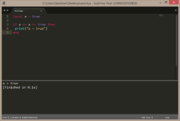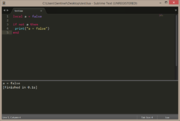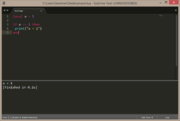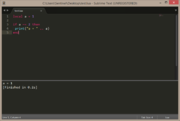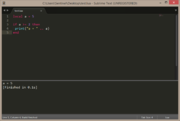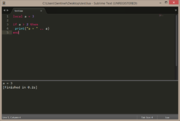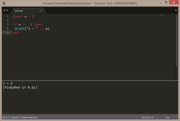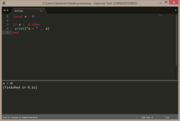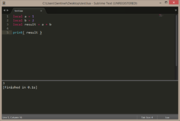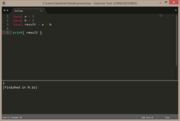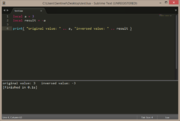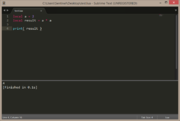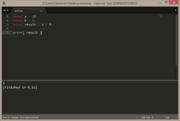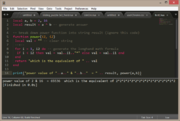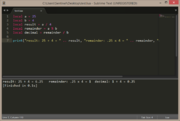Lua operators are expressions used to perform calculations or to pass arguments between different value types.
Conditional Operators
| if |
Query if something does or does not meet a certain condition.
|
| else |
Do something else if the query condition was not met.
|
| elseif |
Used to add additional if queries, if the initial query condition was not met.
|
| end |
This is used to close various queries or functions; there must be the same amount of end as if; except in instances where elseif has been used.
|
if
if statements are one of the most common staples of programming, because programs & games & just about everything we do in life consists of if queries; should I wear this tie today? Do I need to go grocery shopping after work? Should I buy this game, or that game? etc. etc.
Let's say that we have a variable called var & we want to check if the var contains a boolean value of true...
local var = true
if var == true then
print("var = true")
end
| Quick note: if a variable contains a boolean value of true or false, then there is no need to use definitive query based operators as the variable on it's own will return the boolean value.
|
Now we want to perform the same query, but we want to check if the variable is false instead...
local var = true
if var == false then
print("var = false")
end
What do you think will happen when we run the code above? That's right, absolutely nothing will happen because var still contains the boolean value of true & we haven't told the program what to do if the variable doesn't return false, so let's do that now by using an else operator...
else
local var = true
if var == false then
print("var = false")
else
print("var = true")
end
Because the variable contains a boolean value of true, we skip the if var == false block of code & execute the line of code in the else section instead, which would print "var = true" to the log.
elseif
Alternatively we can use elseif conditional operators to instead of else to query multiple different things. Below we are querying if var is true or false.
local var = true
if var == false then
print("var = false")
elseif var == true then
print("var = true")
end
end
This is pretty self-explanatory. All if queries, loops & functions require you to close them off with an end statement, the difference between them being that for nested if queries, there must be the same amount of end as there are if operators; the only exception to this rule is when you use elseif because it's not classed as a new if query but a continuation of the same query.
Logical Operators
| and |
Allows you to check multiple conditions in a single if query.
|
| or |
Allows you to add an alternative if query into a single if query.
|
| not |
Checks if condition equals false or negative.
|
and
| if condition a is true and condition b is false then |
|
local a = true
local b = false
if a == true and b == false then
print("a = true", "b = false")
end
|
|
or
| if condition is true or condition == true then |
|
local a = true
if a or a == true then
print("a = true")
end |
|
not
| if condition is not true |
|
local a = false
if not a then
print("a = false")
end |
|
Comparison Operators
| == |
Equal to.
|
| ~= |
Does not equal.
|
| >= |
Greater than or equal to.
|
| > |
Greater than.
|
| <= |
Less than or equal to.
|
| < |
Less than.
|
equal to
| if a equals 1 |
|
local a = 1
if a == 1 then
print("a = 1")
end |
|
does not equal
| if a does not equal 2 |
|
local a = 1
if a ~= 2 then
print("a = " .. a)
end |
|
greater than or equal to
| if a is greater than or equal to 2 |
|
local a = 5
if a >= 2 then
print("a = " .. a)
end |
|
greater than
| if a is greater than 2 |
|
local a = 3
if a > 2 then
print("a = " .. a)
end |
|
less than or equal to
| if a less than or equal to 2 |
|
local a = 2
if a <= 2 then
print("a = " .. a)
end |
|
less than
| if a less than 2 |
|
local a = 0
if a < 2 then
print("a = " .. a)
end |
|
Mathematical Operators
| + |
Add
|
| - |
Subtract or invert
|
| * |
Multiply
|
| / |
Divide
|
| ^ |
Power
|
| % |
Remainder
|
add
| 1 + 2 = 3 |
|
local a = 1
local b = 2
local result = a + b
print( result ) |
|
subtract
| 3 - 2 = 1 |
|
local a = 3
local b = 2
local result = a - b
print( result ) |
|
inverse
| inv of 3 = -3 |
|
local a = 3
local result = -a
print( "original value: " .. a, "inversed value: " .. result ) |
|
multiply
| 2 x 2 = 4 |
|
local a = 2
local result = a * a
print( result ) |
|
divide
| 10 ÷ 5 = 2 |
|
local a = 10
local b = 5
local result = a / b
print( result ) |
|
power
| base of 2, power of 8 (2ⁿ) = 256 |
|
local a, b = 2, 16
local result = a ^ b -- generate answer
-- break down power function into string result (ignore this code)
function power(i1, i2)
local val = "" -- clear string
--+--
for i = 1, i2 do -- generate the longhand math formula
if i < i2 then val = val..i1.."*" else val = val..i1 end
end
return "which is the equivalent of " .. val
end
print("power value of "..a.." & "..b.." = " .. result, power(a,b)) |
|
remainder
| remainder of 25 ÷ 4 = 1 |
|
local a = 25
local b = 4
local result = a / 4
local remainder = a % b
local decimal = remainder / b
print("result: 25 ÷ 4 = " .. result, "remainder: .25 x 4 = " .. remainder, "decimal: 1 ÷ 4 = " .. decimal ) |
|

